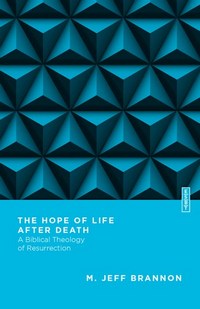 The Hope of Life After
The Hope of Life After
Death: A Biblical Theology
of Resurrection
by M. Jeff Brannon
DETAILS: Series: Essential Studies in Biblical Theology Publisher: IVP Academic Publication Date: November 14, 2022 Format: Paperback Length: 172 pg. Read Date: December 18-25, 2022

…the resurrection of Jesus changes every other day, from now and into eternity. For those who are united to Christ, their future is the future of their Savior, and this reality changes everything.
What’s The Hope of Life After Death About?
Unlike most books about the resurrection from the dead—this isn’t an apologetic work, nor does it focus on Paul’s theology of resurrection, instead Brannon states (fitting with this series) that he wants to take a look at the idea of resurrection from Genesis to Revelation, looking at the shadows, prophecies and promises contained in the Old Testament and the reality demonstrated and guaranteed in the New.
He’s primarily thinking of the resurrection of the believer—although that involves (and is grounded upon) the resurrection of Christ. The resurrection of the believer is such a vital doctrine, that believers should have a better understanding of it—but the amount of literature (both on the academic and popular levels) about it pales in comparison to other areas of Christian doctrine.
One of the hallmarks of biblical theology is the progressive revelation of God’s redemptive plan, which unfolds throughout the Old Testament. In Genesis 3:15 God’s promise that the offspring of the woman will crush the head of the serpent represents an implicit promise of resurrection. In Psalm 49:7-15 the psalmist is convinced that God will redeem his people from death and take them to himself. Isaiah prophesies that God will swallow up death forever (Is 25:7-8) and that there will be a bodily resurrection for God’s people (Is 26:19). All of this reaches its Old Testament climax with Daniel’s prophecy of physical resurrection for both the redeemed and the unredeemed, one to everlasting life and the other to shame and everlasting contempt (Dan 12:1-3). The Old Testament teaching on resurrection sets the stage for God’s revelation in the New Testament, when the lights are turned on.
The Old Testament
The best part of this book was the survey of the Old Testament material—over five chapters—Creation, the Fall, the Pentateuch and Historical Books, the Writings, and the Prophets—Brannon spends about half of the book examining the part of the Bible that’s less-often considered for our understanding of the doctrine.
I don’t know how many times I’ve read or heard that the Old Testament is silent or vague on the idea of bodily resurrection. Brannon puts that assertion to rest easily.
But more importantly, this survey is a great cause for comfort and reassurance for the believer. This idea, this hope, has been before believers of all ages and we can cling to it as believers have for centuries. We have this hope explained in clearer terms—with the lights on, to continue Brannon’s metaphor—so it’s easier to cling to that hope.
So, what did I think about The Hope of Life After Death?
My focus in this book has been on the themes of creation life, death as the result of the fall, and the hope of resurrection life in redemption. The resurrection of Jesus means that the new age, the age of resurrection, has been inaugurated. While life had been promised, prophesied, and pictured in the old covenant, the resurrection of Jesus marks the beginning of the fulfillment of the curse of death being undone through resurrection life.
That’s the argument of the book in a nutshell, and what a great argument it is—one to really relish and depend on.
Brannon is clear and helpful here, and these are ideas we all need to spend time with and have a better understanding of. This is a solid way to start with that.
I do wonder if he could’ve gone a little deeper with a few chapters—I thought it was the easiest book in this series to read, and that’s not just Brannon’s style, I think it was that his approach didn’t require as much thought as others in the series did. I’m not certain about that point, however—and I don’t mean to complain about it. It was just the sense I had while reading the book
It was a good, helpful, and useful book about important and neglected teachings—maybe I wanted it to be a little better, but it’s definitely good. I do recommend it.

This post contains an affiliate link. If you purchase from it, I will get a small commission at no additional cost to you. As always, the opinions expressed are my own.
![]()




Read Irresponsibly, but please Comment Responsibly